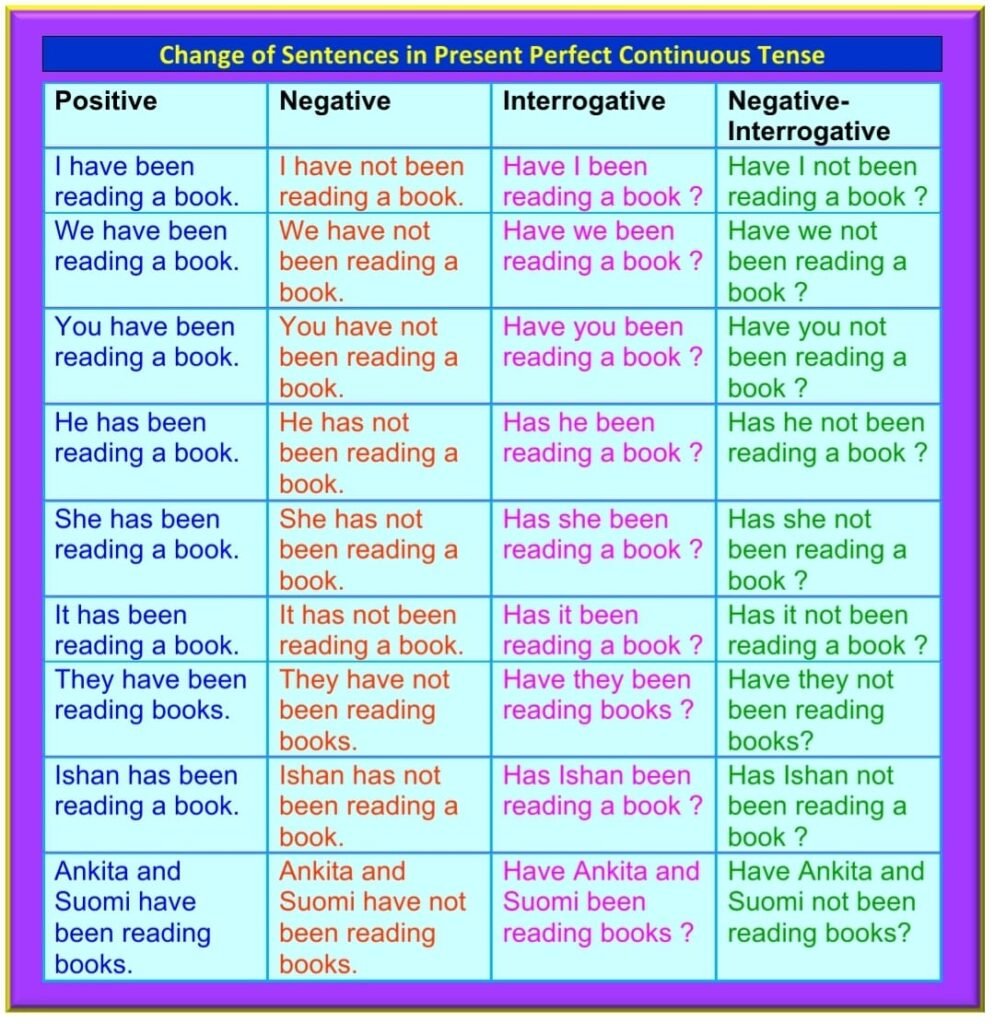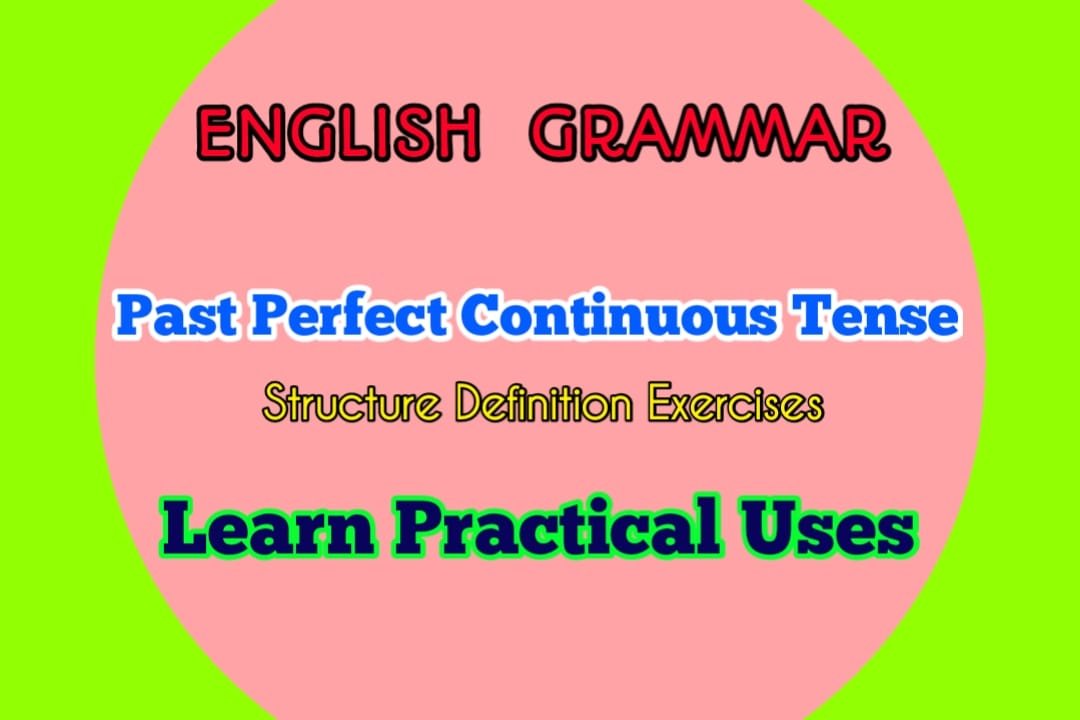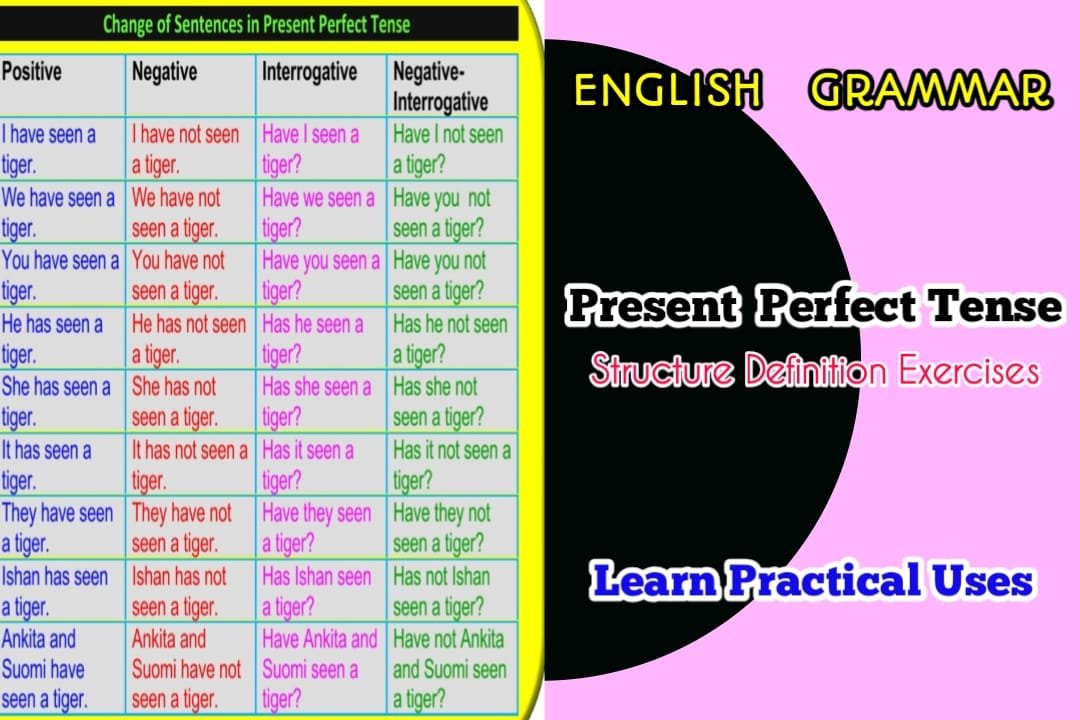Present Perfect Continuous Tense Structure has been provided here with rules of use and practical examples. This Present Perfect Continuous Tense Structure is an important topic in English Grammar as we need it for writing as well as speaking.
Present Perfect Continuous Tense
Present Perfect Continuous tense is used to express an action that began in the past, is in progress at the time of speaking, and will continue for some time in the future or has just ended. For Example,
Example: It has been raining since morning.
Example: He has been suffering from a fever for seven days.
In the above examples, the action words are ‘rain’ and ‘suffer’. In the first example, ‘rain’ began at some point of time in the morning and is still continuing. That means the action has a starting point but it has no ending and in the second example, ‘suffering’ has been continuing for a period of seven days. That means the action has a starting point and an ending point as well. So, we can say the verbs in the above two sentences are in the Present Perfect Continuous Tense.
Rules of use of Present Perfect Continuous Tense
Rule 1
We use present perfect continuous tense when an action going on for some time and is not finished yet.
- Example: The worker has been working for six hours.
Rule 2
We use present perfect continuous tense when we want to mention an action started or how long it has been in progress.
- Example: They have been playing the game since morning.
Rule 3
We use the point of time in the present perfect continuous tense.
- Example: It has been raining since morning.
Rule 4
We use the period of time in the present perfect continuous tense.
- Example: He has been suffering from a fever for seven days.
Rule 5
Use of For, Since, and From.
Point of Time & Period of Time When it refers to 'Point of Time' we use 'since' in Present Perfect Tense, Present Perfect Continuous Tense, and Past Tense. we use 'from' in all other tenses in case of Point of Time. 'Point of Time' refers to an action that has a particular time, but its end has not been mentioned. Example: I have been travelling since night. When it refers to 'Period of Time' we use 'for' in every tense. 'Period of Time' refers to the duration of any action. It has a beginning and also it has an ending. Example: We have been watching the movie for two hours. Point of Time: since and from Period of Time: for
Present Perfect Continuous Tense Structure with Examples
Present Perfect Tense structure in different sentences has been presented in the following. Get them for practical use while speaking or writing.
Positive Sentence or Declarative Sentence
Structure
Subject + Have / Has + Been + Verb + Ing + Object.
Table
| Person | Singular | Plural |
| 1st | I have been eating rice. | We have been eating rice. |
| 2nd | You have been eating rice. | You have been eating rice. |
| 3rd | He / She / (It) has been eating rice. | They have been eating rice. |
Other Examples
- He has been playing football for two hours.
- Students have been making mistakes.
- You have been reading history since morning.
- John has been doing the work for four hours.
- We have been chanting the mantras for half an hour.
Negative Sentence
Structure
Subject+Have/Has+not +Been +Verb+Ing +Object
Table
| Person | Singular | Plural |
| 1st | I have not been eating rice. | We have not been eating rice. |
| 2nd | You have not been eating rice. | You have not been eating rice. |
| 3rd | He / She / (It) has not been eating rice. | They have not been eating rice. |
Other Examples
- He has not been playing football for two hours.
- Students have not been making mistakes.
- You have not been reading history since morning.
- John has not been doing the work for four hours.
- We have not been chanting the mantras for half an hour.
Interrogative Sentence
Structure
Have/Has + Subject+ not + Been + Verb + Ing + Object?
Table
| Person | Singular | Plural |
| 1st | Have I been eating rice? | Have we been eating rice? |
| 2nd | Have you been eating rice? | Have you been eating rice? |
| 3rd | Has he/she/(it) been eating rice? | Have they been eating rice? |
Other Examples
- Has he been playing football for two hours?
- Have students been making mistakes?
- Have you been reading history since morning?
- Has John been doing the work for four hours?
- Have we been chanting the mantras for half an hour?
Negative-Interrogative Sentence
Structure
| Structure:- Have / Has + Subject( If Pronoun) + Not + Been + Verb + Ing + Object? |
| Structure :- Have/Has + Not + Subject (If Noun)+Been + Verb+ Ing + Object ? |
- If the Subject is “NOUN”, “Not” will be placed before “Subject”.
Example:- Has not Harris been doing the work for three hours?
- If the Subject is “PRONOUN”, “Not” will be placed after “Subject”.
Example:- Has it not been raining since morning?
Table
| Person | Singular | Plural |
| 1st | Have I not been eating rice? | Have we not been eating rice? |
| 2nd | Have you not been eating rice? | Have you not been eating rice? |
| 3rd | Has he/she/(it) not been eating rice? | Have they not been eating rice? |
Other Examples
- Has he not been playing football for two hours?
- Have not students been making mistakes?
- Have you not been reading history since morning?
- Has not John been doing the work for four hours?
- Have we not been chanting the mantras for half an hour?
Change of Sentences in Present Perfect ContinuousTense

Exercises
1. Complete the following sentences with the Present Perfect Continuous forms of the Verbs given in brackets.
(i)Man …………….(try) to conquer diseases.
(ii) Rathin …………………(learm) English for five years.
(iii) It………………………. (rain) for three days.
(iv) The boy……………………. (lie) on the floor for three hours.
(v) His father ………………….. (work) in the post office for twenty years.
(vi) They ……………………….(study) French for three years.
(vii) She ……………………….. (read) David Copperfield this week.
(viii) I………………………….(write) letters all afternoon.
(ix) The baby …………………………………(cry) all the morning.
(x) You ………………………….. (live) in England since 1981.
(xi) Who……………………….. (teach) you Hindi recently?
(xii) What………… you…………. (do) since yesterday ?
(xiii) How long that fire …………………….(burn)?
(xiv) His father ………………………….(wait) for you since eight o’clock.
(xv) My friend . ………………………… (be) ill for a long time.







